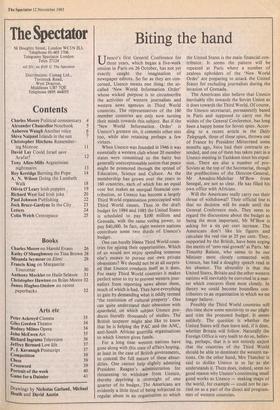Biting the hand
Unesco's first General Conference for three years, which began a five-week session in Paris on 26 October, has not yet exactly caught the imagination of newspaper editors. So far as they are con- cerned, Unesco means one thing: the so- called 'New World Information Order' whose wicked purpose is to circumscribe the activities of western journalists and western news agencies in Third World countries. The representatives of the 160 member countries are only now turning their minds towards this subject. But if the 'New World Information Order' is Unesco's greatest sin, it commits other sins too, while also retaining perhaps a few virtues.
When Unesco was founded in 1946 it was essentially a western club whose 20 member states were committed to the batty but generally unexceptionable notion that peace might be promoted through the spread of Education, Science and Culture. As the membership has grown over the years to 160 countries, each of which has an equal vote but makes an unequal financial con- tribution, so Unesco has become a largely Third World organisation preoccupied with Third World causes. Thus in the draft budget for 1984 and 1985 the United States is scheduled to pay $100 million and Grenada, with the same voting power, to pay $40,000. In fact, eight western nations contribute some two thirds of Unesco's budget.
One can hardly blame Third World coun- tries for seizing their opportunities. Which of us would not enjoy spending someone else's money to pursue our own private obsessions? We should not be at all surpris- ed that Unesco conducts itself as it does. For many Third World countries it makes perfect sense to try to prevent western jour- nalists from reporting news about them, much of which is bad. They have everything to gain by demanding what is oddly termed 'the restitution of cultural property'. One can quite understand their obsession with apartheid, on which subject Unesco pro- duces literally thousands of studies. The British taxpayer might also like to know that he is helping the PAC and the ANC, anti-South African guerrilla organisations to which Unesco gives funds.
For a long time western nations have gone along with this state or affairs hoping, at least in the case of British governments, to conceal the full nature of these absur- dities. One cannot help slightly admiring President Reagan's administration for threatening to withdraw from Unesco, thereby depriving it overnight of one quarter of its budget. The Americans are evidently a little tired of being subjected to regular abuse in an organisation to which the United States is the main financial con- tributor. It seems the pattern will be repeated at Paris where a number of zealous upholders of the 'New World Order' are preparing to attack the United States for excluding journalists during the invasion of Grenada.
The Americans also believe that Unesco inevitably tilts towards the Soviet Union as it does towards the Third World. Of course, the Unesco secretarial, permanently based in Paris and supposed to carry out the wishes of the General Conference, has long been a happy home for Soviet spies, Accor- ding to a recent article in the Daily Telegraph, three of these spies, thrown out of France by President Mitterrand some months ago, have had their contracts ex- tended, and one of them has taken part in a Unesco meeting in Tashkent since his expul- sion. There are also a number of pro- Soviets at the top of the Secretariat, though the predilections of the Director-General, Mr Amadou-Mahthar M'Bow from Senegal, are not so clear. He has filled his own office with Africans.
Will the Americans really carry out their threat of withdrawal? Their official line is that no decision will be made until the General Conference ends. They seem to regard the discussions about the budget as being the most important, Mr M'Bow is asking for a six per cent increase. The Americans don't like his figures and calculate the real rise at 25 per cent. They, supported by the British, have been urging the merits of 'zero real growth' at Paris. Mr Timothy Raison, who seems to be our Minister most closely connected with Unesco, has had a doughty speech read in his absence. The absurdity is that the United States, Britain and the other western nations will inevitably be outvoted in a mat- ter which concerns them most closely. In theory we could become boundless con- tributors to an organisation in which we no longer believe.
Possibly the Third World countries will this time show some sensitivity to our plight and irim the proposed budget. It seems unlikely. The question is whether the United States will then leave and, if it does, whether Britain will follow. Naturally the Foreign Office is very loath to do so, believ- ing, perhaps, that it is not entirely unjust that the countries of the Third World should be able to dominate the western na- tions. On the other hand, Mrs Thatcher is said to dislike Unesco in so far as she understands it. There does, indeed, seem no good reason why Unesco's continuing small good works as Unesco — making maps of the world, for example — could not be car- ried on as a part of the direct aid program- mes of western countries.














































 Previous page
Previous page